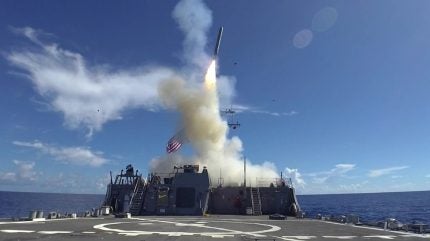
Tucson Arizona-based Raytheon has clinched a contract worth $287m to extend the operational life of 166 Tomahawk Block IV All-Up-Round Missiles, catering to the needs of both the Navy and foreign military clients.
This initiative aims to ensure operational readiness for an additional 15 years.
This contract modification extends a previously awarded firm-fixed-price, cost-plus-incentive-fee, cost-plus-fixed-fee, indefinite-delivery/indefinite-quantity contract. The primary objective is to undertake recertification and modernisation efforts for the missiles, enabling them to remain operational for up to an additional 15 years of service.
Under this modification, Raytheon will recertify and modernise 166 Tomahawk missiles, 142 of which are designated for the Navy and 24 for foreign military sales customers. The scope of work includes addressing missile obsolescence issues, implementing health monitoring systems, conducting software maintenance, providing depot support, and procuring associated hardware.
In a series of strategic moves in the last two years, key allies have bolstered their defence arsenals with Tomahawk weapon system acquisitions from the United States. Japan secured a $2.35bn deal acquiring up to 200 Tomahawk Block IV and V missiles. Concurrently, Australia finalised a $895m sale of Tomahawk land attack missiles. Meanwhile, the UK Royal Navy’s Tomahawk missiles received a £265m upgrade.
Work under this contract modification is expected to be performed across various locations, with most activities centred in Tucson, Arizona (58.3%). Additional work locations include Bethel, Connecticut; Camden, Arkansas; Clearwater, Florida; East Camden, Arkansas; Huntsville, Alabama; Irvine, California; Keyser, West Virginia; Lincoln, Nebraska; Pontiac, Michigan; and various locations within the continental United States. The completion date for this contract is estimated to be in March 2026.
With 22% of the North American missiles and missile defence systems market, Raytheon Technologies Corp is projected to be the second largest shareholder in the region, according to GlobalData’s “The Global Missiles & Missile Defense Systems Market 2023-2033” report.







